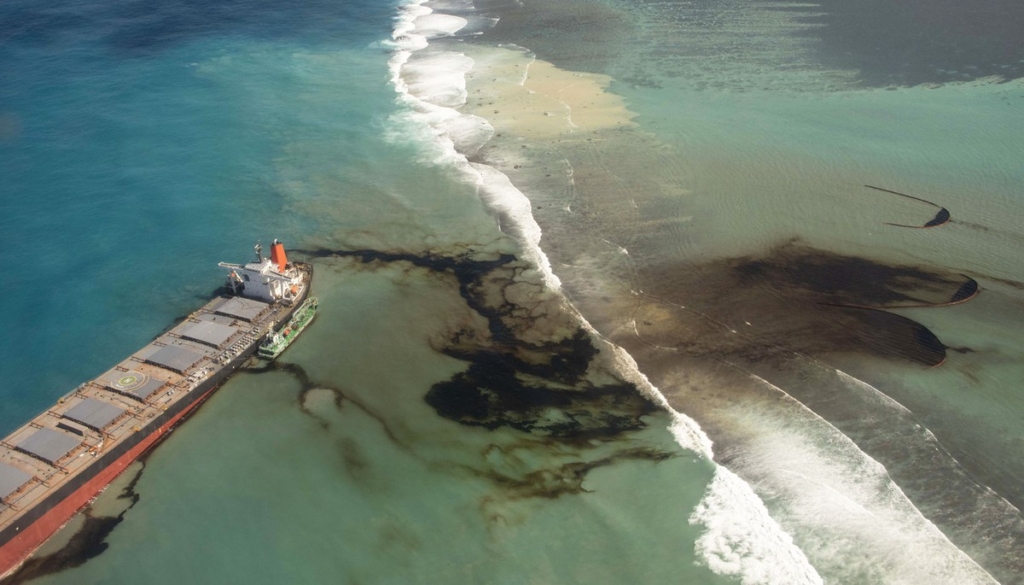September 2, 2020
[vc_row][vc_column][vc_column_text]A ship that ran into a reef on the coast of Mauritius has leaked thousands of tons of oil into the Indian Ocean Lagoon of Mauritius. A cargo ship operated by the Japanese company Mitsui OSK Lines ran into a reef in Pointe d’Esny (Mauritius) on 25 July 2020. It began leaking oil from 6 August and has already, based on the latest information 17th August, spilled more than 1 000 tonnes. As an island that depends on fishing for its food and nutrition, the oil spill has caused devastating impacts on the Mauritius coastline and the livelihoods of its people. The danger to thousands of species around the lagoon will negatively affect the countries’ health, food security and economy. To mitigate these impacts, the island country has relied on efforts from volunteers who have assisted in creating barriers made from sugar cane. This while the government and oil companies involved fail to act adequately. Small-scale fishers suffer terribly – their access to livelihood resources wiped out or massively reduced. The extraction of fossil fuels from the Earth by oil and gas industries continues to cause massive harm to communities in the developing world. The over-exploitation of natural resources driven by profit-making and global value chains not only causes destruction to the natural environment but also puts communities’ lives and livelihoods in danger.[/vc_column_text][vc_single_image image=”20399″ img_size=”full” add_caption=”yes” alignment=”right”][vc_column_text]For generations, Coastal and Inland Fishing communities in Africa have relied on the environment to safeguard traditions and livelihoods. These communities have a sacred relationship with the sea, which represents their food source and a core element of their identities. Human created disasters such as oil spillages are thus catastrophic. The destruction caused by the oil spill in Mauritius is a result of institutional failures that allow extractive industries to pursue greed driven profit strategies over the welfare of local people. The Voluntary Guidelines For Securing Sustainable Small-Scale Fishing in the context of Food Security and Poverty Eradication of the FAO (SSF Guidelines) assert the rights of small-scale fishers. Chapter 9 directs that parties involved in human-induced disasters be held accountable for the impact of these disasters and that States should support these communities through mitigation and aid plans, where appropriate. As part of our commitment to ensure that human rights of fishing communities are fully implemented, in line with the principles of the SSF Guidelines, the members of the African Advisory Group stands in solidarity with affected coastal and fishing communities in Mauritius and neighbouring islands. In addition, we call on the Mauritian government and the Japanese company Mistui OSK Lines to fund the complete cleaning and rehabilitation of the marine and costal environment to its original state as a matter of urgency. Additionally, we call on the Japanese and the Mauritian government to support local cleaning efforts and develop stronger policies and plans that protection the environment and the people whose livelihood depends on it through human rights-based ocean governance. We demand for a mechanism that allows fishers to express complains for the government to redress to be set up, and for this mechanism to include the financial compensation for affected small-scale fishers and women employed in the value chain. In addition, we demand the Mistui OSK Lines to provide multifaceted support to the communities affected by the oil spill through compensatory actions for their activities. After a complete clean-up, studies must be carried out in Mauritius and its surroundings to evaluate the fishing resource and to assess the effects of the oil spill on the marine environment. The Government of Mauritius must draw up a marine environment management plan which will take into account the monitoring of the island’s behaviour after the oil spill and assess the medium and long-term effects.
By Aphiwe Moshani, Secretariat for the Africa regional Advisory Group hosted by Masifundise.
[/vc_column_text][/vc_column][/vc_row]
